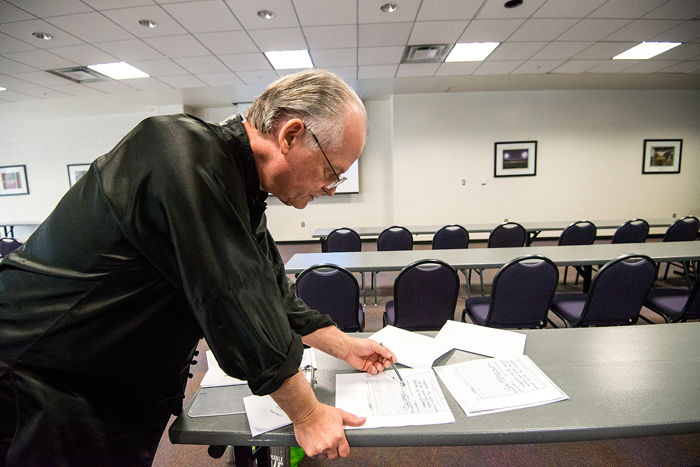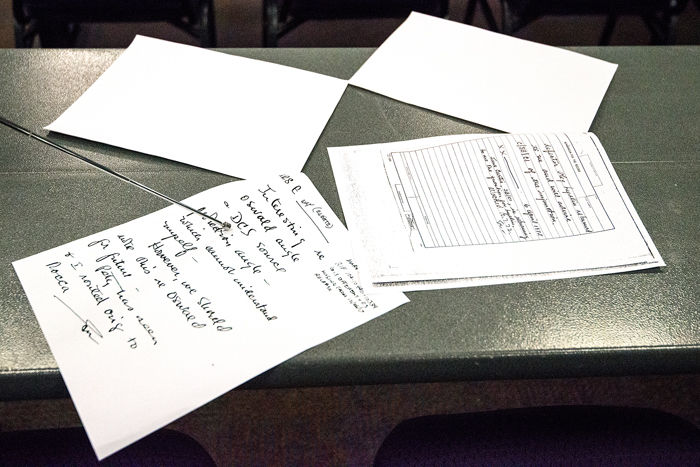 By VIC BRADSHAW Daily News-Record
By VIC BRADSHAW Daily News-Record
HARRISONBURG — John M. Newman said Tuesday morning that he spent too much time talking to reporters in recent days to dive deeply into the recently released documents related to President John F. Kennedy’s assassination, with international television crews at his home and calls from print journalists around the globe.
But he’s had a chance to study between 400 and 500 of what he thinks are the key pages out of the thousands made available to the public Thursday night, and he’s intrigued by what he’s found and hasn’t found. “Having been around this case since the early 1990s, I know pretty much how to hit the high-value stuff,” said Newman, a James Madison University adjunct professor of political science and author of four books on JFK, his assassination, and Lee Harvey Oswald, whom history tells us was the assassin. “There were 50 that were never before released at all. I’ve been through those.”
The thing that’s captivated him most so far is the re-release of an April 1972 memo handwritten by a then-CIA agent.
In the document, which lists “Harvey Lee Oswald” as the subject, the agent writes that then-CIA Director Richard Helms indicated that “the agency was NOT, under any circumstances, to make inquiries or ask questions of any source or defector about Oswald.” What’s important about the memo is that the third page says Oswald was a source for the CIA, providing information about the Soviets. “That contradicts a 50-year lie that [CIA officials] never talked to him,” Newman said of Oswald. “The people involved — those the memo was to and from and the people who were shown the document — were all involved in counterintelligence.”
That’s significant enough as it is. But Newman’s curiosity is piqued because he has a copy of the three pages released in the early 1990s. The version released Thursday had only two pages, and it was given a different document number than the initial release.
“I was amazed,” the retired U.S. Army intelligence officer said, “to see one piece disappear and not be released with the other two pieces it belongs with. Obviously, that was an attempt to disconnect it from [the previously released] document.”
Newman’s Theory
Newman, a Harrisonburg resident, will provide more of his impressions at 7 p.m. Thursday when he presents “KGB-CIA Spy Wars: Oswald’s intelligence files and the CIA’s Soviet Russia Division.” The event is scheduled for the Highlands Room at JMU’s Festival Conference and Student Center and is free and open to the public.
“Everybody was lying,” he said of the Soviet and American intelligence agencies. “Oswald was at the center of the chessboard.”
Newman already has published two of the five-book series he’s writing on the Kennedy assassination: “Where Angels Tread Lightly” and “Countdown to Darkness.” The presentation essentially will be the fifth chapter of Volume 3, which he’s working on now.
A consultant to director Oliver Stone for his 1991 film “JFK,” Newman said he isn’t focused on who shot Kennedy or how many shooters there were.
He personally thinks there probably was more than one shooter, but isn’t convinced of it, and he questions whether Oswald could have shot the president as he rode through Dealey Plaza on Nov. 22, 1963, and escaped the Texas School Book Depository so quickly as to encounter a Dallas police officer moments after the shooting.
His focus is on who is behind the slaying. Did the shooter or shooters act alone, or were they emissaries of some organization?
Based on his research, Newman has developed a hypothesis that President Lyndon Johnson used “a very complicated psychological warfare operation” to get Supreme Court Chief Justice Earl Warren to head the President’s Commission on the Assassination of President Kennedy.
The commission determined that both Oswald and Jack Ruby, who shot and killed Oswald two days after JFK’s slaying, acted alone. Conspiracy theorists have long doubted the panel’s findings.
Newman said he thinks Johnson “browbeat” Warren to head the commission and stay away from conspiracy theories by telling the chief justice that identifying the KGB or Cuban leaders as masterminds of the plot to kill Kennedy would prompt a nuclear holocaust that would leave 40 million Americans dead. Documents with false information, Newman claims, were put in Oswald’s file to persuade Warren that Oswald did the communists’ bidding, though neither the Soviets nor Cuban Prime Minister Fidel Castro had anything to do with it.
“Warren thinks it’s the truth,” Newman said. “He had to tamp down what he thought was the truth to save lives.”
As evidence of the duplicity, the professor notes that tapes made in the Oval Office include Johnson boasting about what he’d done to Warren Commission member Sen. Richard Russell and Warren relaying a similar version of the exchange on public television in the 1970s.

More To Come
The documents didn’t provide the trove of information historians and researchers expected as Thursday approached. Legislation passed by Congress and signed into law by President George H.W. Bush on Oct. 26, 1992, called for all assassination records to be released no more than 25 years from that date. But last-minute appeals by the FBI and CIA prompted President Donald Trump to withhold some documents for six months. Newman said only about 6,000 pages were released, about 12 percent of the total expected.
Newman called the development “very disappointing” and said he’s “angry” with both agencies for waiting 25 years to request redactions in the documents. April 26 is the new expected release date.
“There’s no reason anybody in the government now would be withholding documents. That would be bad for democracy,” he said. “A law was passed. It needs to be complied with. If not, this sore will fester.
“It’s critical to get the documents out there and let people make up their own minds.”
Visit Dr. Newman’s website HERE.




 The Review Board concluded its duties on September 30, 1998, and transferred its records to NARA. In its
The Review Board concluded its duties on September 30, 1998, and transferred its records to NARA. In its